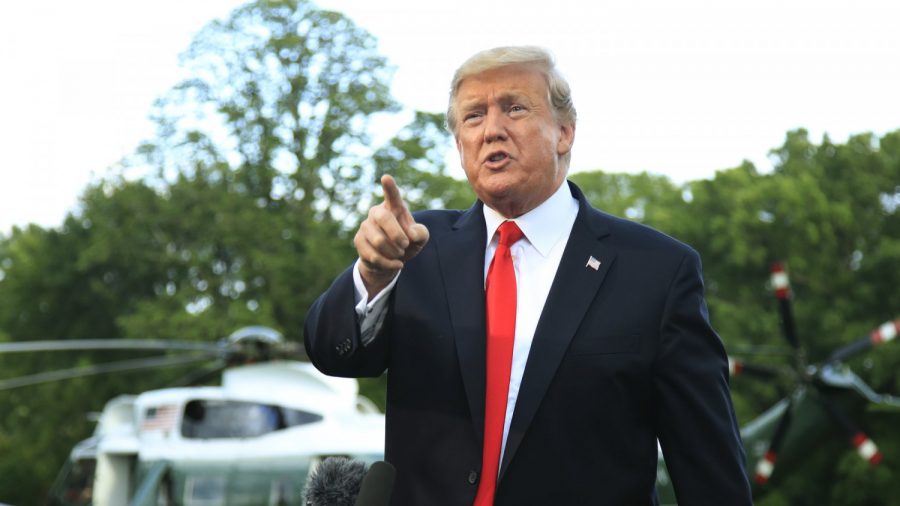Some 15 hours after Iran shot down an American surveillance drone, President Donald Trump issued a statement: “Iran made a very big mistake!”
Posted in a June 20 tweet, the sentence underscores the tension between the United States and the Islamic regime, which Trump has put under an unprecedented economic pressure.
Iran made a very big mistake!
— Donald J. Trump (@realDonaldTrump) June 20, 2019
Iran shot down the MQ-4C Triton drone on June 20, local time, saying it was on a spy mission over its territory. Washington, however, said the aircraft was targeted in international air space.
“Iranian reports that the aircraft was over Iran are false. This was an unprovoked attack on a U.S. surveillance asset in international airspace,” said Navy Capt. Bill Urban, U.S. Central Command spokesman, in a June 20 statement.
He confirmed the aircraft was downed “by an Iranian surface-to-air missile system while operating in international airspace over the Strait of Hormuz at approximately 11:35 p.m. GMT on June 19, 2019.”
The Strait of Hormuz is a crucial choke point between the Persian Gulf and the Gulf of Oman through which flows about a third of the world’s oil shipments. Iran has previously threatened to shut it down in response to U.S. sanctions.
The downing of the drone was the latest in an escalating series of incidents since mid-May including explosive strikes on six oil tankers.
Iran has denied involvement in any of the attacks, but the Trump administration on June 19 displayed limpet mine fragments it said came from an oil tanker damaged in June 13 attacks, saying the ordnance closely resembled mines publicly displayed in Iranian military parades.

Pressure
Trump has pummeled Iran’s economy by reimposing economic sanctions after he withdrew the United States from the Iran nuclear deal in May 2018.
The deal, negotiated by the Obama administration, aimed to postpone Iran’s ability to build a nuclear weapon by about a decade, in exchange for lifting economic sanctions and releasing some $120 billion in frozen Iranian assets.
Trump criticized the deal for being weak and incomplete. He demands that Iran stop enriching uranium, distributing ballistic missiles, developing nuclear-capable missiles, supporting terrorist groups and militias—including Hezbollah, Hamas, the Houthis, and the Palestinian Islamic Jihad—withdraw forces from Syria, stop threatening U.S. allies, stop cyberattacks and threats to international shipping, and more.
Iran has refused to negotiate, and instead is trying to convince the other signatories of the nuclear deal—Russia, China, the United Kingdom, France, and Germany—to secure for Iran the deal’s economic benefits. As that effort has so far mostly failed, Iran has threatened to quickly start enriching uranium again, which would likely lead to its breaching the parameters of the deal.
Response
It’s not clear if the downing of the drone would prompt military repercussions from the United States.
Both Trump and Iran’s Supreme Leader Ali Khamenei previously said they don’t want war.
The State Department referred questions to the Pentagon, which didn’t immediately respond to a request for comment.
Saudi Arabia, Washington’s main gulf ally, said Iran had created a grave situation with its “aggressive behavior” and the kingdom was consulting other Gulf Arab states on next steps.
“When you interfere with international shipping it has an impact on the supply of energy, it has an impact on the price of oil which has an impact on the world economy. It essentially affects almost every person on the globe,” Adel al-Jubeir, Saudi minister of state for foreign affaiars, told reporters in London.
House of Representatives Speaker Nancy Pelosi told reporters on June 20 that 20 lawmakers will receive a briefing to learn more about the incident.
“I think it’s a dangerous situation,” she said. “We have to be strong and strategic about how we protect our interests. We also cannot be reckless in what we do, so it will be interesting to see what they have to say.
“I don’t think the president wants to go to war. There’s no appetite for going to war in our country.”
Reuters contributed to this report.
From The Epoch Times


